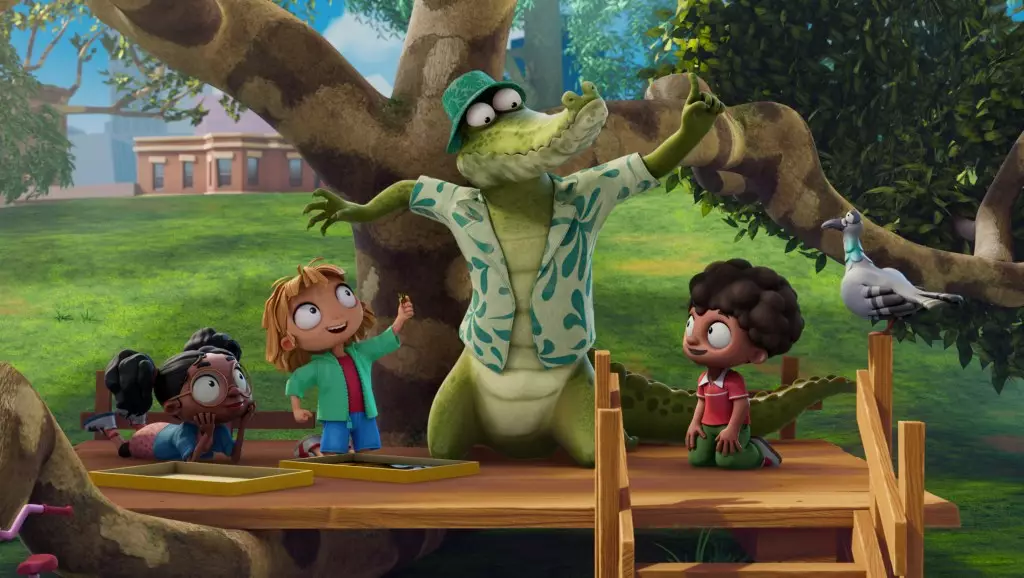Nickelodeon’s recent acquisition of the animated series *Mr. Crocodile* marks an exciting chapter in children’s television, showcasing a blend of whimsical storytelling and vibrant animation. Based on the beloved book by French author Joann Sfar, this show aims to bridge the gap between classic literature and modern-day entertainment. As a center-wing liberal, I find this endeavor particularly commendable in a world where children’s content often drowns in a sea of mindless entertainment and commercialism.
Sfar’s original work, *Mister Crocodile is Very Hungry*, not only delights children but also imparts valuable life lessons about friendship, acceptance, and adventure—all themes desperately needed in contemporary children’s programming. The series revolves around the charming bond between an eight-year-old girl named Daisy and her friendly crocodile companion, Mr. Crocodile. Their adventures in a diverse mobile home community serve as a testament to the importance of community and empathy, crucial traits for children to learn in today’s increasingly fragmented society.
An Unlikely Protagonist with a Heart of Gold
The choice of a crocodile as a protagonist is both audacious and refreshing. Mr. Crocodile’s character embodies the concept of “judging a book by its cover”—his toothy grin simplifies the deeper moral complexity that Sfar likely sought to present. This character prompts viewers to reconsider preconceived notions about differences and acceptance. When Daisy and Mr. Crocodile encounter daily challenges, they do so with a unique blend of curiosity and naivety, leading to comical misunderstandings fueled by his instinctive “crocodile logic.”
Such imaginative storytelling is vital; it stimulates a child’s creativity and encourages them to embrace the quirks of their friends and family. Mr. Crocodile is not just a character but an invitation for children to explore different perspectives and embody compassion, something particularly poignant in an increasingly polarized world.
The Importance of Representation and Acceptance
The narrative unfolds in a mobile home community with diverse characters, a choice that resonates with contemporary values of inclusion and acceptance. In a time when children are bombarded with stereotypes and unrealistic portrayals, *Mr. Crocodile* breaks that mold by presenting a world where differences are celebrated rather than shunned. The dynamic between Daisy and her crocodile friend exemplifies how varied backgrounds can come together to form meaningful friendships, reinforcing the message that love and understanding supersede prejudice.
What’s commendable is Nickelodeon’s intent to showcase this story globally through their Nick Jr. channels. Cultural exchange, especially in children’s media, offers an invaluable opportunity for kids to experience a mélange of narratives and lifestyles, further broadening their horizons.
An Investment in Future Generations
In a statement made by Layla Lewis, Nickelodeon’s Senior Vice President for Global Acquisitions, she ardently expressed their commitment to delivering engaging content for children. There’s a sincerity in that proclamation, especially considering how many networks are choosing profit over quality. By backing innovative projects like *Mr. Crocodile*, Nickelodeon is not only investing in entertainment but also in the developmental tools that will shape the next generation’s perspectives. Children deserve stories that incite both laughter and reflections on their own lives.
Additionally, the involvement of Joann Sfar and his team from Magical Society underscores the significance of creative authenticity in this adaptation. The meticulous transition from a beloved book to a CGI series, while retaining the whimsical essence of Sfar’s universe, is a notable example of how art can evolve without losing its heart.
Calling for Change in Children’s Content
As we embrace the arrival of *Mr. Crocodile*, let us call upon fellow industry leaders to recognize the importance of creating genuinely enriching content for young audiences. The landscape of children’s animation needs more stories that challenge societal norms and reflect the diverse tapestry of human experiences. Mr. Crocodile and Daisy’s escapades remind us all of the joyful chaos inherent in friendship and life—lessons that surely should be woven into the fabric of every child’s upbringing.
In the end, the charm of *Mr. Crocodile* lies not merely in its visual appeal but in its powerful ability to resonate with the emotional landscapes of children everywhere. As we look forward to sharing these delightful stories with our young ones, let’s hold onto the hope that more creative endeavors like this will emerge in our ever-evolving media landscape.

Leave a Reply